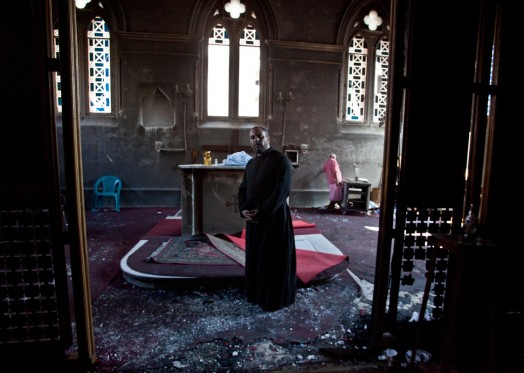Copts under attack

I met only two check points on the desert road to Suez where I went to meet father Bishay in his torched and ravaged churches. He showed me the burned books, the broken crucifixes, the smashed windows and altars, the charred remnants of the orphanage and the looted monastery. In the early morning of Wednesday, August 14th, hundreds of Islamists (and possibly some thugs on the government’s side) stormed and set ablaze the Good Pastor and the Latin Church, stealing all the money, documents, computers, and terrifying the local coptic community. Nobody came to the rescue. As christians were scapegoated for supporting the military ouster of Mr. Morsi, the authorities stood by and watched. More than 60 churches have been vandalized across Egypt in the surge of violence that has followed the bloody raids on the Muslim Brotherhood protest camps in Cairo. The generals in power were were quick to blame “the islamic terrorists” for the attacks. And the religious leaders, not to mention al-Qaida’s Ayman al-Zawahiri and the wahhabi preachers in the Gulf, made little attempt to calm tensions. Abba Rafael, head of the coptic churches in Cairo, squarely told me that “all Brotherhood’s members are terrorists” and blamed foreign news media for misreporting the events. Copts, roughly 10 per cent of the Egyptian population, have faced increasing violence over the years, but since the Arab Spring ouster of president Hosni Mubarak, there have been more incidents and threats against the community. Last October, a coptic protest over anti-christian violence came under attack from the Egyptian military. Twenty-five people were killed and hundreds injured. And since Mohammed Morsi was removed from power in early July, the violence has increased. The Coptic pope, Tawadros II, has received death threats and several christians have been killed. More incidents are expected in the coming weeks and months.





